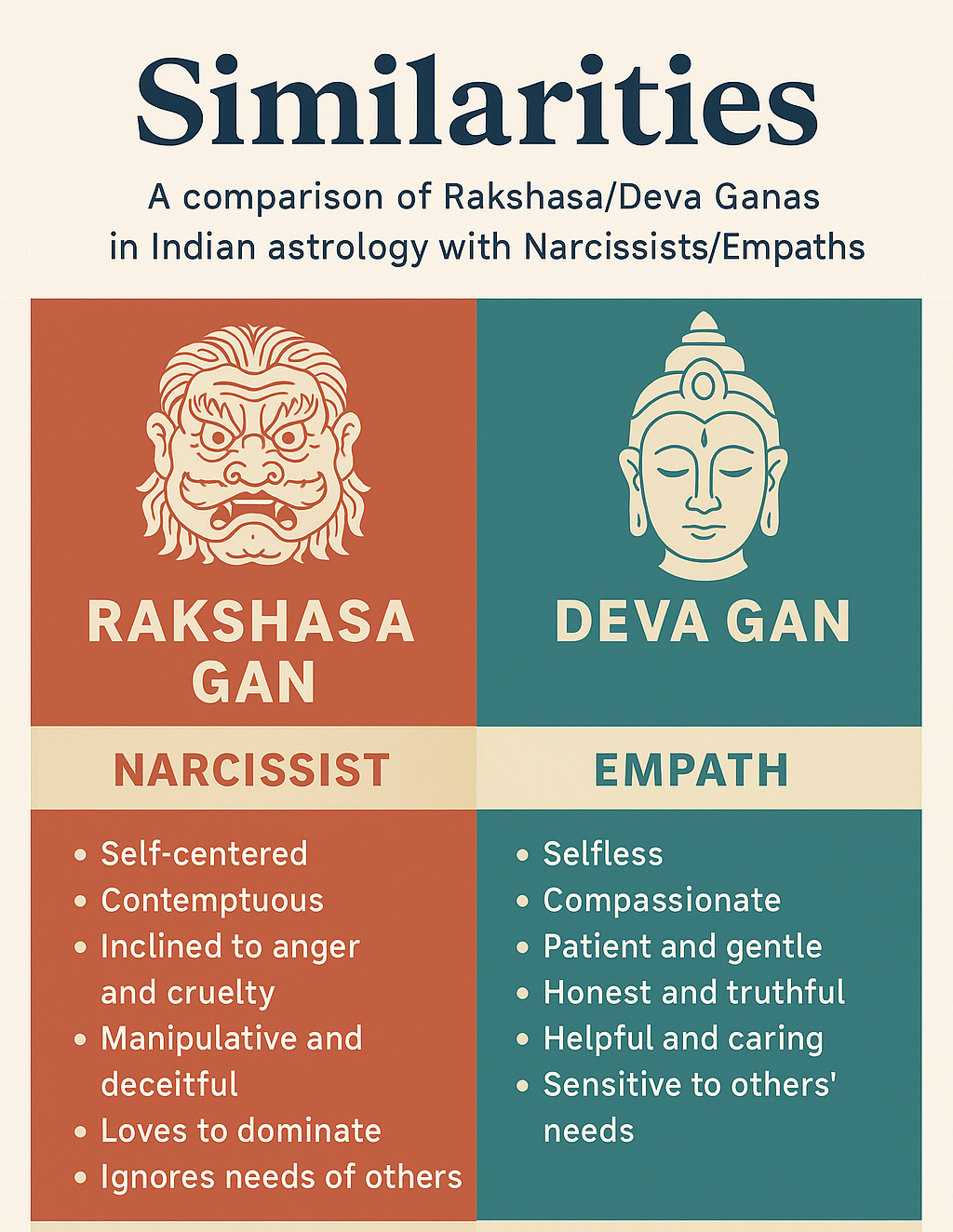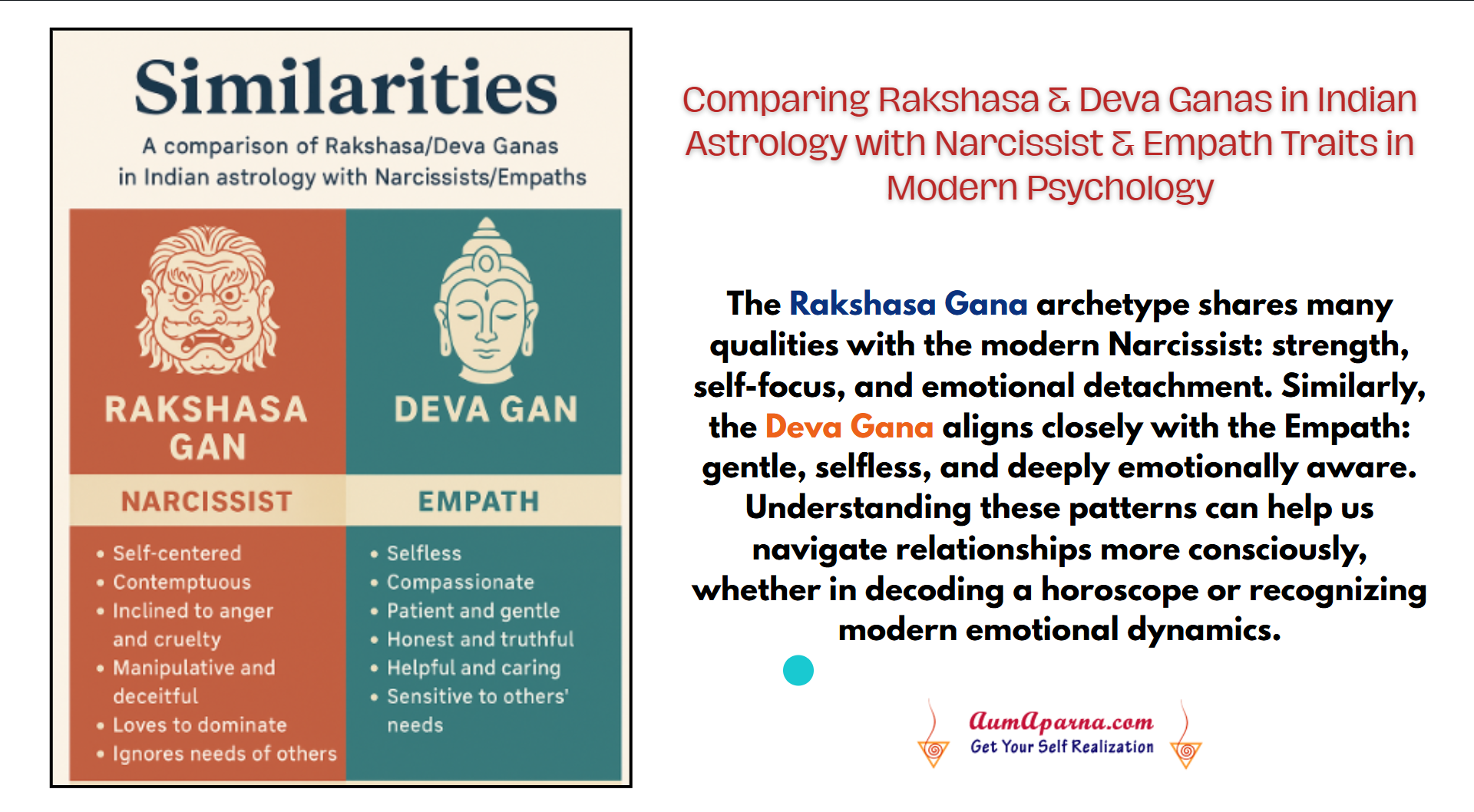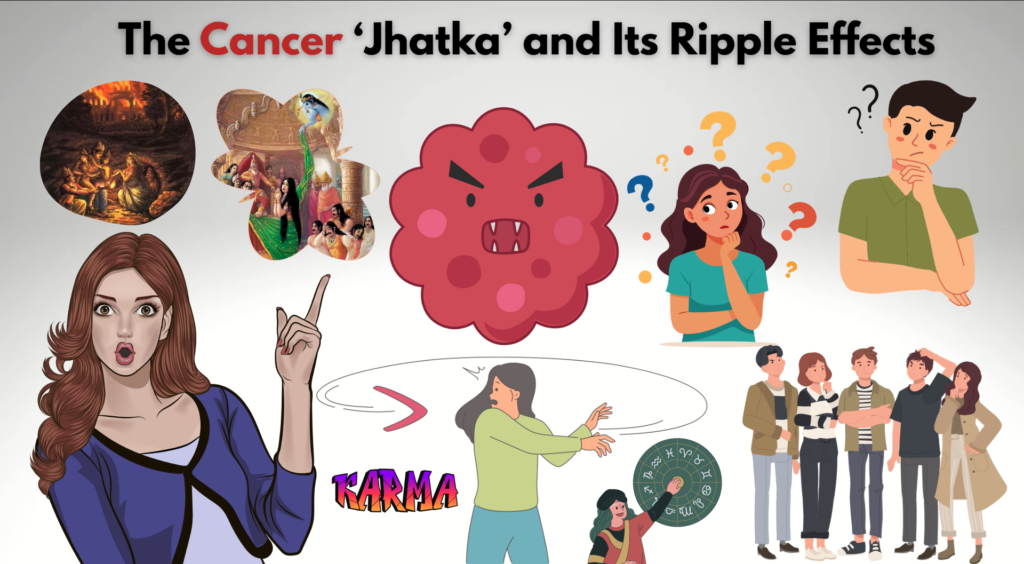Comparing Rakshasa & Deva Ganas in Indian Astrology with Narcissist & Empath Traits in Modern Psychology
Introduction
Vedic astrology beautifully categorizes human nature through the concept of Ganas. Each person is born under one of three: Deva Gana (Divine), Manushya Gana (Human), or Rakshasa Gana (Demonic). These classifications reflect tendencies in temperament, social interaction, and emotional wiring.
Background
In Vedic astrology, each person’s birth star (Nakshatra) falls into one of three Ganas:
| Gana Type | Meaning | Basic Nature |
|---|---|---|
| Deva Gana | Divine, God-like | Gentle, kind, noble |
| Manushya Gana | Human | Balanced, practical, adaptable |
| Rakshasa Gana | Demon, Titan-like | Fierce, strong-willed, self-oriented |
Modern Psychological Terms
| Psychological Trait | Meaning |
|---|---|
| Empath | Deeply sensitive, caring, absorbs emotions of others |
| Narcissist | Self-centered, attention-seeking, lacks empathy |
Interestingly, these ancient archetypes align quite closely with modern psychology’s understanding of Empaths and Narcissists. Let’s explore this fascinating comparison!
Rakshasa Gana vs. Narcissist: The Self-Centric Archetype
| Attribute | Rakshasa Gana (Vedic Astrology) | Narcissist (Psychology) | Similar Traits |
|---|---|---|---|
| Self-Focus | High: Independent and self-driven | High: Self-absorbed, craves admiration | Prioritizes own needs, strong-willed |
| Empathy | Low: Emotional detachment unless bonded | Very Low: Struggles to feel for others | Difficulty understanding others’ emotions |
| Dominance | High: Assertive, confrontational | High: Manipulative, controlling | Desire to lead or dominate |
| Material Attachment | Strong: Drawn to power, status, wealth | Strong: Obsessed with image and status | Chases external validation |
| Emotional Sensitivity | Low: Guarded | Low: Defensive, fragile ego | Avoids emotional vulnerability |
| Charm & Magnetism | High: Impressive, attention-catching | High: Charismatic | Can attract and influence people easily |
| Shadow Side | Manipulative if unbalanced | Emotionally toxic or abusive | Potential for emotional harm to others |
Deva Gana vs. Empath: The Compassionate Archetype
| Attribute | Deva Gana (Vedic Astrology) | Empath (Psychology) | Similar Traits |
| Self-Focus | Low: Selfless, group-centered | Low: Prioritizes others | Compassionate and giving |
| Empathy | Very High: Spiritually sensitive | Extremely High: Absorbs emotions of others | Deep emotional connection with others |
| Dominance | Low: Avoids conflicts, seeks harmony | Low: Avoids confrontation | Gentle and peace-loving |
| Material Attachment | Moderate: Spiritual over material | Low: Emotional fulfillment over material | Disinterested in status and wealth |
| Emotional Sensitivity | High: Intuitive and perceptive | Very High: Deeply affected by emotions | Emotionally open and aware |
| Charm & Magnetism | Gentle: Radiates inner peace | Warm: Emotional warmth | Draws people through kindness |
| Shadow Side | Vulnerable, can be passive | Can be exploited or drained | Risks self-neglect or emotional burnout |
Conclusion:
While Vedic astrology and modern psychology come from entirely different traditions, their understanding of human behavior overlaps in remarkable ways. The Rakshasa Gana archetype shares many qualities with the modern Narcissist: strength, self-focus, and emotional detachment. Similarly, the Deva Gana aligns closely with the Empath: gentle, selfless, and deeply emotionally aware.
Understanding these patterns can help us navigate relationships more consciously, whether in decoding a horoscope or recognizing modern emotional dynamics.
Bonus Insight:
- Rakshasa types are not inherently ‘bad’ or ‘evil’ — they can be protectors and achievers when their energy is balanced.
- Deva types may seem soft, but their strength lies in their spiritual depth and emotional resilience.
Both are necessary archetypes in the cosmic design!






